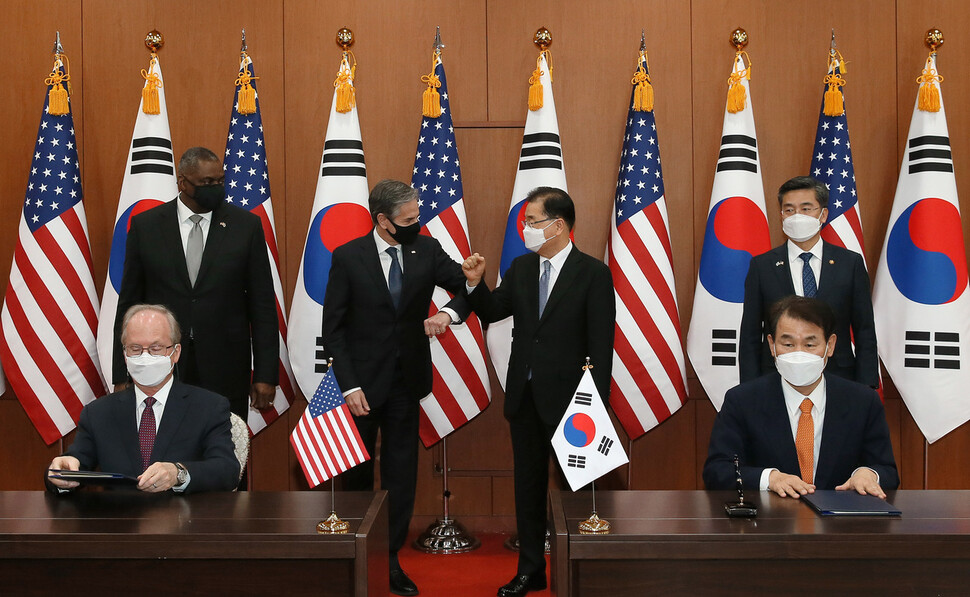Eui-yong “hope to resume North American negotiations”
More emphasis on “reducing the North Korean nuclear threat”
Prefer a multilateral approach to take out’Chinese role theory’
Clearly opposing the reduction of ROK-US joint training
U.S. Ambassador Robert Rapson and Ambassador for the ROK-US Defense Expenses Negotiations at the Ministry of Foreign Affairs Eun-bo Chung and Tony Blincoln, U.S. Secretary of State and Foreign Minister Eui-yong Eui, attended a ceremony on the morning of the 18th at the SMA at the Office of the Ministry of Foreign Affairs in Jongno-gu, Seoul. This elbow is saying hello. Photo Joint Coverage Group
“I support Biden’s new administration’s efforts to contact North Korea. I hope that the denuclearization negotiations between North Korea and the United States will resume as soon as possible.” (Foreign Minister Jeong Eui-yong) “We are working to reduce North Korean missile and nuclear threats against the US and its alliance and improve the lives of North Koreans” (Tonible). Lincoln, US Secretary of State) The first meeting of the US-ROK Ministers of Foreign Affairs and Defense (2+2), which was held after the administration of Joe Biden, was an important test of the future direction of the US government’s policy toward North Korea and China. This is because the foreign policy of the next regime as well as the Moon Jae-in administration, which will be in office in May next year, will be severely restricted depending on what kind of messages the US Secretary of Defense Blincoln and Lloyd Austin are sending out to North Korea and the public, which govern US foreign and defense policies . However, a summary of the remarks on the US side at a press conference after the Korea-US diplomatic ministers’ meeting on the 17th and the 2+2 meeting on the 18th confirms the intention of the Korean government and the’slight gap’. After the 2+2 meeting, the ministers of the two countries at the conference both emphasized the meaning of the’fierce ROK-US alliance’, but disagreements were revealed in a number of areas. Minister Blincoln re-emphasized the position of the US-Korea alliance as “the core axis of peace, security and prosperity in Northeast Asia, the Indo-Pacific and the world” and emphasized that “we have come not only to reaffirm our alliance, but also to develop it further”. . The two key officials of the Biden administration awakened that the US regards the US-ROK alliance so important that it chooses Korea as the first net defense, and called for more active cooperation in US foreign policy, which is summed up as’China’s check’. However, Minister Chung confirmed that “there was no direct discussion” about Quad, which is a security cooperation in four countries including the United States. Regarding North Korea policy, which is a concern of the U.S., the South Korean government has repeatedly revealed that it would be a good idea to start the North Korea-U.S. dialogue as soon as possible based on the North Korea-US Singapore Summit on June 12, 2018. The two US ministers agree that “the North Korean nuclear issue is an urgent issue and close cooperation between the two countries is paramount.” Minister Blincoln adhered to the term “denuclearization of North Korea” instead of “denuclearization of the Korean Peninsula” included in the Singapore Joint Declaration. On the contrary, on the 17th and 18th, for two days in a row, Minister Chung used the term’denuclearization of the Korean peninsula’, saying, “We will continue to cooperate to advance the peace process on the Korean Peninsula.” In the end, the term “denuclearization of the Korean Peninsula” was not included in the joint declaration. A government official said, “When it comes to denuclearization of the Korean peninsula, it seems that (the United States) is not easily accepted because we must also check the US military base in Korea and the strategic assets that are brought to Korea.” The United States also declares that it will “maintain a combined readiness against all common threats through combined training and practice”, and it is clear that it will carry out the combined training that was postponed or reduced in order to promote North Korea-US dialogue during the Trump administration. did. Instead, the emphasis was on North Korea’s’human rights issue’ and a’multilateral approach’ to respond to the North Korean nuclear issue. On the 17th as well as on the 18th, Minister Blincoln emphasized that “the North Koreans are being abused under the oppressive regime.” This is a point that implies that even if the Biden administration initiates dialogue with North Korea, unlike the Trump administration, human rights will be an issue and high-intensity pressure will be applied. Minister Blincoln then expressed the view that “I think China can play a very important role” as well as allies such as Korea and Japan in resolving the North Korean nuclear issue. During the Trump administration, bilateral negotiations between North Korea and the United States were promoted, and the’role theory of China’, which had disappeared, was brought up again. Another point of conflict was the China issue. Minister Blincoln said on the 17th, “We are witnessing the dangerous erosion of democracy in the world,” and mentioned China’s’coercive attitude’ in Hong Kong, Taiwan, Xinjiang, Tibet, and the South China Sea in a strong tone. “We discussed the consequences of China’s aggressive and authoritative actions in the Indo-Pacific region. A global democratic recession is appearing. It has become more important to fight China’s anti-democracy.” Minister Chung appeared on the afternoon of the 18th and said, “It is impossible to choose between the US and China, and such an approach is impossible. The US and China have never made such a request to us.” By Gil Yoon-hyung and Kim Ji-eun, staff reporter [email protected]
newsletter
Every morning, every Thursday day
A friendly newsletter that will save you from the flood of news.
Meet
